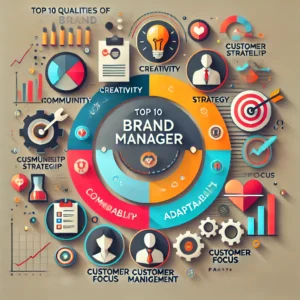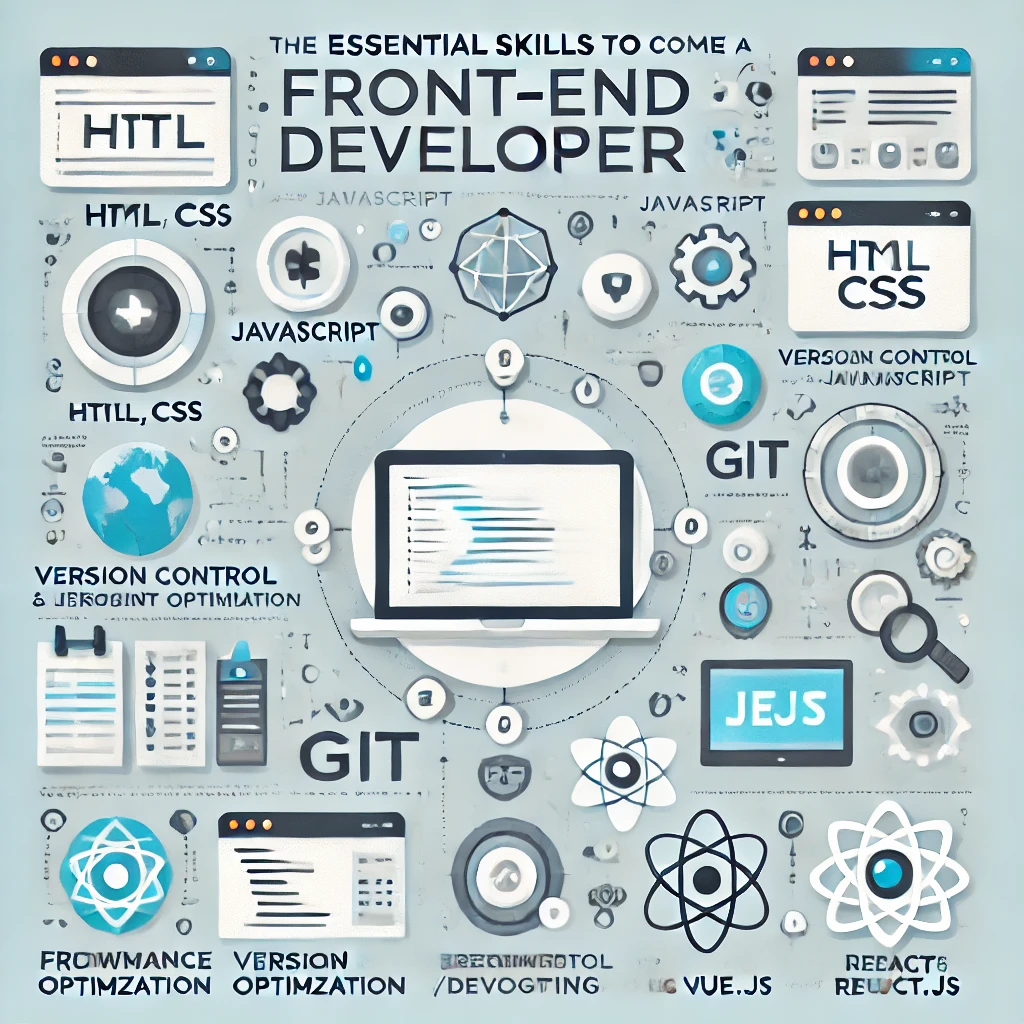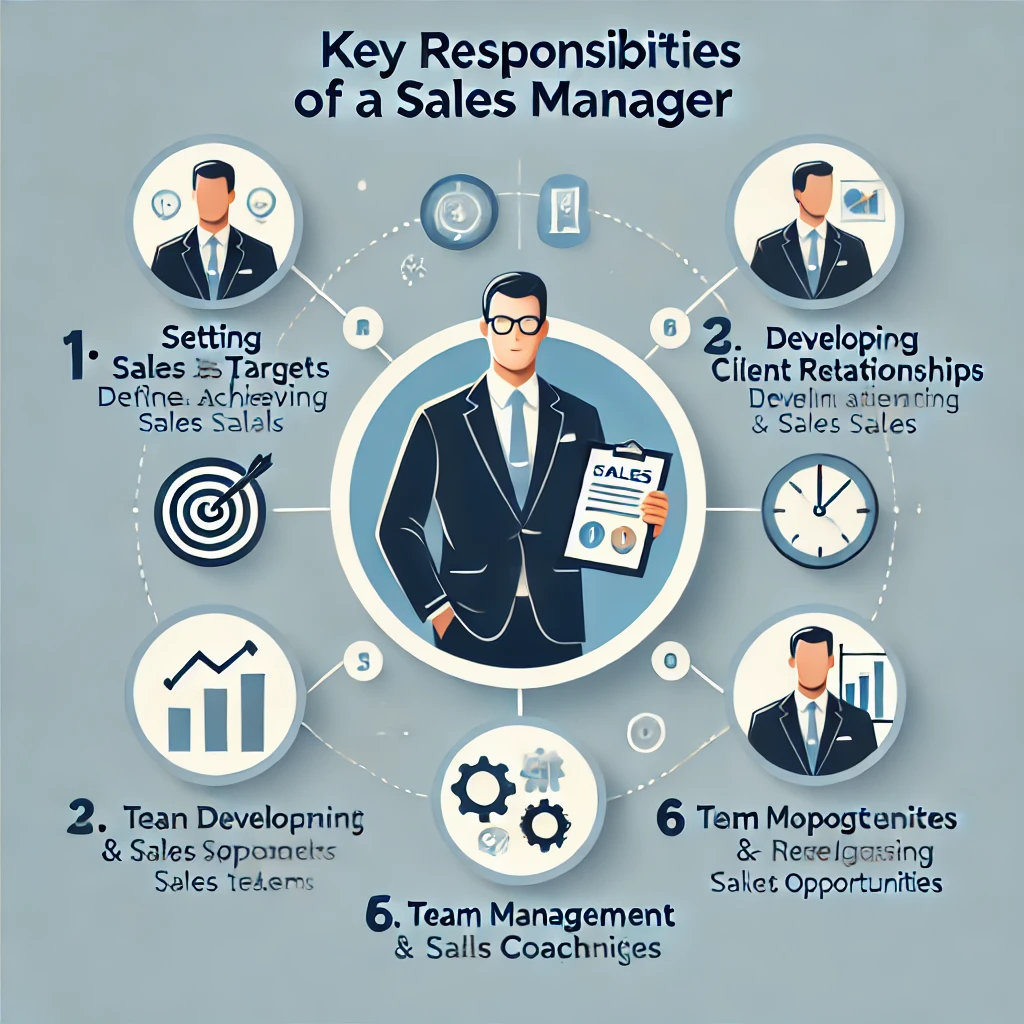Top 10 Qualities Of A Brand Manager- To become a brand manager is a good career choice for those curious about marketing, storytelling, and strategic decision-making. This role involves how a company’s products or services are seen by customers, driving business success. Brand managers have many roles, from managing advertising campaigns to conducting market research, etc.
Top 10 Qualities Of A Brand Manager

Responsibilities of a Brand Manager.
Brand managers are at the core of a company’s marketing and communication efforts. Here’s an overview of their primary responsibilities:
1. Developing Brand Strategies.
Brand managers are responsible for creating long-term plans that define how a brand will be positioned in the market. They identify the brand’s unique qualities, what makes it stand out, and how it can appeal to customers. This strategy becomes the foundation for all marketing and communication activities.
2. Understanding the Target Audience.
A big part of the job involves researching and understanding the preferences, habits, and needs of the people the brand wants to attract. By studying market trends, customer feedback, and competitor behavior, brand managers ensure that the brand remains relevant and desirable.
3. Running Marketing Campaigns.
Brand managers plan and oversee advertising campaigns designed to promote their products or services. They work with creative teams to develop ads, social media posts, and other content that communicates the brand’s message effectively.
4. Maintaining Brand Consistency.
Every piece of content a company creates—from social media posts to packaging—must reflect the brand’s identity. Brand managers ensure that the logo, colors, tone, and messaging remain consistent across all platforms. This helps customers recognize and trust the brand.
5. Monitoring Brand Performance.
To ensure their strategies are working, brand managers track the performance of campaigns. They use tools like surveys, website analytics, and sales data to measure success. If something isn’t working, they analyze the problem and make adjustments to improve results.
6. Collaborating with Teams.
Brand managers don’t work alone. They coordinate with teams like sales, product development, advertising, and public relations to make sure everyone is aligned with the brand’s goals. For example, if the product team is launching a new item, the brand manager ensures it fits the brand image and has the right marketing support.
7. Managing Budgets.
A brand manager often oversees the budget for advertising and promotions. They decide how to allocate resources whether it’s spending on social media ads, TV commercials, or sponsorships ensuring every dollar is used effectively to maximize impact.
8. Handling Brand Reputation.
If a brand faces criticism or a public relations crisis, the brand manager takes action. They work with PR teams to manage the situation, respond to concerns, and repair trust with customers.
9. Innovating to Stay Competitive.
Markets and trends change rapidly. A brand manager must stay ahead by introducing fresh ideas and innovative strategies. This could mean launching new products, creating partnerships, or experimenting with new marketing techniques.
RELATED BLOG: Graphics Designer: Step-by-Step Guide on How to Become a Graphics Designer
Essential Skills to Become a Brand Manager.
To survive as a brand manager, you need creative and analytical skills. Here is what stands out:
1. Strategic Thinking.
Brand managers need to think ahead and plan long-term strategies for their brand. This means understanding the company’s goals and creating a target for achieving them. For example, if the goal is to increase brand awareness, there would be need to decide which marketing channels to focus on, how to allocate budgets, and the timeline for results. Strategic thinking helps you align your efforts with the bigger picture.
2. Communication Skills.
Clear communication is essential for brand managers because they work with many teams, including marketing, sales, design, and external agencies. You’ll need to explain your ideas, present strategies, and convince stakeholders to support your vision. Writing skills are also important for crafting compelling messages for campaigns, advertisements, and social media posts.
3. Creativity.
Creativity allows brand managers to develop unique ideas that make a brand stand out. They need to brainstorm campaign themes, design innovative advertising concepts, and come up with catchy slogans or taglines. Creativity isn’t just about art, it is about solving problems in new ways. For example, if your brand faces tough competition, a creative campaign can help you attract more customers.
4. Analytical Skills.
Data is at the heart of modern brand management. Brand managers must analyze market trends, customer feedback, and campaign performance to make informed decisions. For instance, if a campaign isn’t performing well, you’ll need to identify why and adjust your strategy. Tools like Google Analytics, Excel, and CRM platforms help you track data and measure success.
5. Leadership and Teamwork.
Brand managers often lead projects involving multiple departments. Strong leadership skills are necessary to inspire and guide teams toward shared goals. At the same time, teamwork is critical because you’ll work closely with others to execute your strategies. Good leaders listen to feedback, resolve conflicts, and make everyone feel valued.
6. Adaptability.
The market and customer preferences are always changing. As a brand manager, you need to adapt quickly to new trends, technologies, or unexpected challenges. For example, if a competitor launches a disruptive product, you may need to revise your strategies to stay competitive. Being flexible and open-minded ensures your brand stays relevant.
7. Time Management.
Brand managers juggle many responsibilities, from planning campaigns to coordinating events. Strong time management skills help you prioritize tasks and meet deadlines without feeling overwhelmed. Using tools like calendars, and project management software, and setting clear goals can make your day more organized and productive.
8. Negotiation Skills.
You’ll often negotiate with vendors, advertising agencies, or even internal departments to get the best outcomes for your brand. Effective negotiation ensures you stay within budget while still receiving high-quality work. For example, when collaborating with an influencer, you may need to negotiate fees or the scope of the partnership.
9. Customer-Centric Mindset.
Understanding what your customers want is key to creating a successful brand. Brand managers need to think like their audience, what are their needs, preferences, and pain points? By keeping the customer at the center of your strategy, you’ll build a brand that blends in with them and earns their loyalty.
10. Attention to Detail.
In brand management, small details matter. From the color of your logo to the tone of your advertisements, everything contributes to how the audience perceives your brand. Missing a detail could lead to inconsistencies that confuse or alienate customers. A keen eye for detail ensures everything aligns with the brand’s identity.
11. Financial Acumen.
Managing a brand often involves handling budgets for campaigns, events, or partnerships. Understanding how to allocate resources efficiently is a valuable skill. For example, you might need to decide whether spending more on digital ads will yield better results than investing in traditional media. Financial acumen helps you maximize your marketing ROI.
12. Networking and Relationship Building.
Building strong relationships with colleagues, industry professionals, and customers is critical for long-term success. Networking can open doors to partnerships, collaborations, and new opportunities. As a brand manager, there would be need to maintain good relationships with external agencies, influencers, and other stakeholders to execute campaigns effectively.
RELATED BLOG: Top 10 Career Opportunities In Marketing And Sales
Qualities That Define a Successful Brand Manager.
There are certain things that qualifies a brand manager. The following are the major qualities of a brand manager:
1. Visionary Thinking.
A great brand manager has the ability to see the bigger picture. They envision how the brand should evolve to stay relevant and competitive. This means not just focusing on current goals but also planning for long-term success. Visionary thinking allows them to anticipate market trends and customer needs before they happen, ensuring the brand always stays ahead.
2. Emotional Intelligence (EQ).
Understanding emotions, both your own and for others is a key trait for a brand manager. They must connect with their audience on a deeper level by crafting messages that evoke the right feelings. Emotional intelligence also helps in managing teams, building strong relationships, and resolving conflicts with empathy and tact.
3. Decision-Making Skills.
Brand managers often face situations where quick and effective decisions are necessary. Whether it’s adjusting a campaign strategy, allocating budgets, or responding to a brand crisis, they must weigh the options and choose the best course of action. Good decision-making balances creativity with data-driven analysis.
4. Creativity and Innovation.
Creativity is at the heart of brand management. A brand manager must constantly come up with fresh ideas to capture the audience’s attention and differentiate the brand in a crowded market. Whether it’s a new ad campaign, a product launch strategy, or a brand redesign, innovative thinking helps the brand stay exciting and memorable.
5. Resilience and Adaptability.
The world of brand management can be unpredictable. Campaigns may fail, consumer preferences can shift, and competitors can throw surprises. A successful brand manager remains calm under pressure, learns from mistakes, and adapts strategies quickly to meet new challenges. Resilience ensures they bounce back stronger, while adaptability helps them thrive in a fast-paced environment.
6. Strong Communication Skills.
Brand managers are the voice of the brand, so effective communication is essential. They need to convey their ideas clearly to team members, stakeholders, and external partners. They also use their communication skills to create compelling messages that resonate with customers. Listening is equally important, understanding feedback from customers and colleagues helps refine strategies.
7. Leadership and Teamwork.
A brand manager leads cross-functional teams, including designers, marketers, and salespeople. Strong leadership ensures the team stays motivated and aligned with the brand’s goals. At the same time, teamwork skills are necessary to collaborate effectively and create a unified brand vision. A successful brand manager knows how to inspire and bring out the best in their team.
8. Analytical Thinking.
Data plays a big role in modern brand management. A brand manager must analyze performance metrics, customer feedback, and market trends to make informed decisions. Analytical thinking ensures campaigns are not just creative but also effective in achieving measurable results.
9. Relationship-Building Skills.
Building strong relationships with internal teams, external agencies, and customers is essential. A brand manager’s success often depends on their ability to collaborate and maintain trust with others. Positive relationships create a smooth workflow and ensure the brand’s image is consistently represented.
10. Passion for the Brand.
Finally, passion for the brand they represent is a defining quality of any successful brand manager. When a brand manager truly believes in the product or service, it reflects in their work. This enthusiasm helps them inspire their team, connect with customers, and drive the brand forward.
Conclusion.
Becoming a brand manager is an exciting journey that combines creativity, strategy, and leadership. By developing the right skills, gaining hands-on experience, and staying updated on industry trends.












